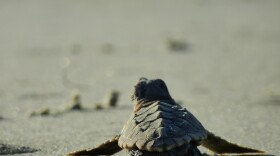An Outer Banks beach nourishment project has caught more sea turtles than expected.
The Virginian-Pilot of Norfolk, Virginia, reports that the National Oceanic and Atmospheric Administration says the dredging company has accidentally snagged 65 sea turtles since starting the project — instead of the 17 expected by scientists. Agency spokeswoman Allison Garrett said in an email that only one of the 65 turtles died, which is far below scientists' forecast of eight.
The work being done by Great Lakes Dredge and Dock is part of a plan to widen about 8 miles of beaches along Duck, Southern Shores, Kitty Hawk and Kill Devil Hills. The work occurs around the clock and will last all summer.
Federal authorities are overseeing the work's effects on the environment.
NOAA's Garrett said there has been an unusually large number of cannonball jellyfish, which is the turtles' preferred meal. The jellyfish could be attracted by warmer than normal surface temperatures.
The sea turtles tagged and released by observers aboard the dredges include 52 loggerhead, two Kemp's ridley and 10 leatherback sea turtles. Loggerheads are listed as threatened, while leatherbacks are endangered.
A government news release says catching and releasing the turtles isn't expected to harm the species. But the number captured so far is a concern, said Dennis Pohl, president of the Outer Banks-based Network for Endangered Sea Turtles.
"Chances are they will break 100," Pohl said. "Nobody really knows what effects it has on sea turtles."
The government doesn't plan to penalize the dredging company and work will not be delayed, the Bureau of Ocean Management said.








